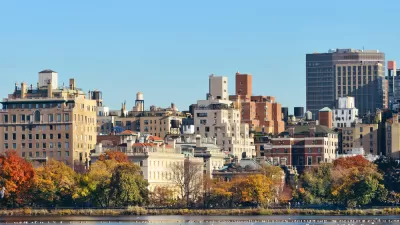Kaid Benfield of the NRDC thinks it is time to add more specifics to the definition of smart growth. He prescribes a set of six new focus areas, including equity and health, that he argues should be emphasized in the 21st-century smart growth agenda.
In a recent post to his blog, Benfield writes:
"It has been a dozen years or so, fifteen at the most, since a broad but committed group of advocates and organizations coalesced around a shared set of beliefs that, borrowing from then-Maryland-governor Parris Glendening's landmark legislation, we called 'smart growth.' The phrase suited the movement because it emphasized that we were not opposed to population and economic growth, but we felt it was important to accommodate it in a smarter way: one that reduces the environmental, economic and social costs of unchecked suburban sprawl and brings investment and opportunity back to communities that had been left behind in the building boom on the fringe of our cities and metro areas."
"I'm still for that and, if you're reading this, chances are that you are, too. But what about the particulars? Have we learned anything in the last decade and a half, and are we sufficiently applying what we have learned? I would say yes, and no, respectively. I'll get to that in a minute but, first, let's look at where we've been."
FULL STORY: It's time to update the definition of "smart growth"

Planetizen Federal Action Tracker
A weekly monitor of how Trump’s orders and actions are impacting planners and planning in America.

Maui's Vacation Rental Debate Turns Ugly
Verbal attacks, misinformation campaigns and fistfights plague a high-stakes debate to convert thousands of vacation rentals into long-term housing.

Restaurant Patios Were a Pandemic Win — Why Were They so Hard to Keep?
Social distancing requirements and changes in travel patterns prompted cities to pilot new uses for street and sidewalk space. Then it got complicated.

In California Battle of Housing vs. Environment, Housing Just Won
A new state law significantly limits the power of CEQA, an environmental review law that served as a powerful tool for blocking new development.

Boulder Eliminates Parking Minimums Citywide
Officials estimate the cost of building a single underground parking space at up to $100,000.

Orange County, Florida Adopts Largest US “Sprawl Repair” Code
The ‘Orange Code’ seeks to rectify decades of sprawl-inducing, car-oriented development.
Urban Design for Planners 1: Software Tools
This six-course series explores essential urban design concepts using open source software and equips planners with the tools they need to participate fully in the urban design process.
Planning for Universal Design
Learn the tools for implementing Universal Design in planning regulations.
Heyer Gruel & Associates PA
JM Goldson LLC
Custer County Colorado
City of Camden Redevelopment Agency
City of Astoria
Transportation Research & Education Center (TREC) at Portland State University
Jefferson Parish Government
Camden Redevelopment Agency
City of Claremont




























